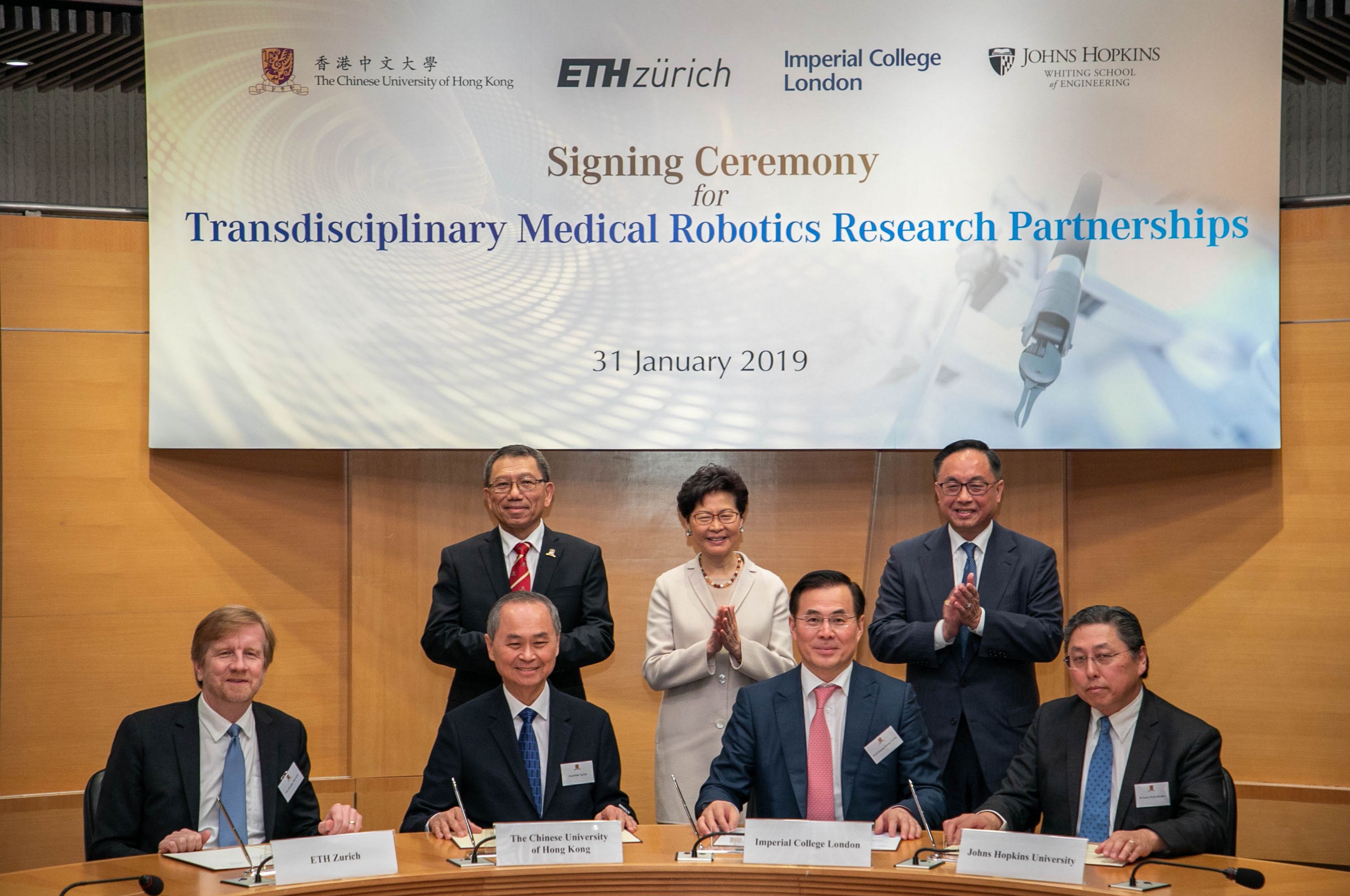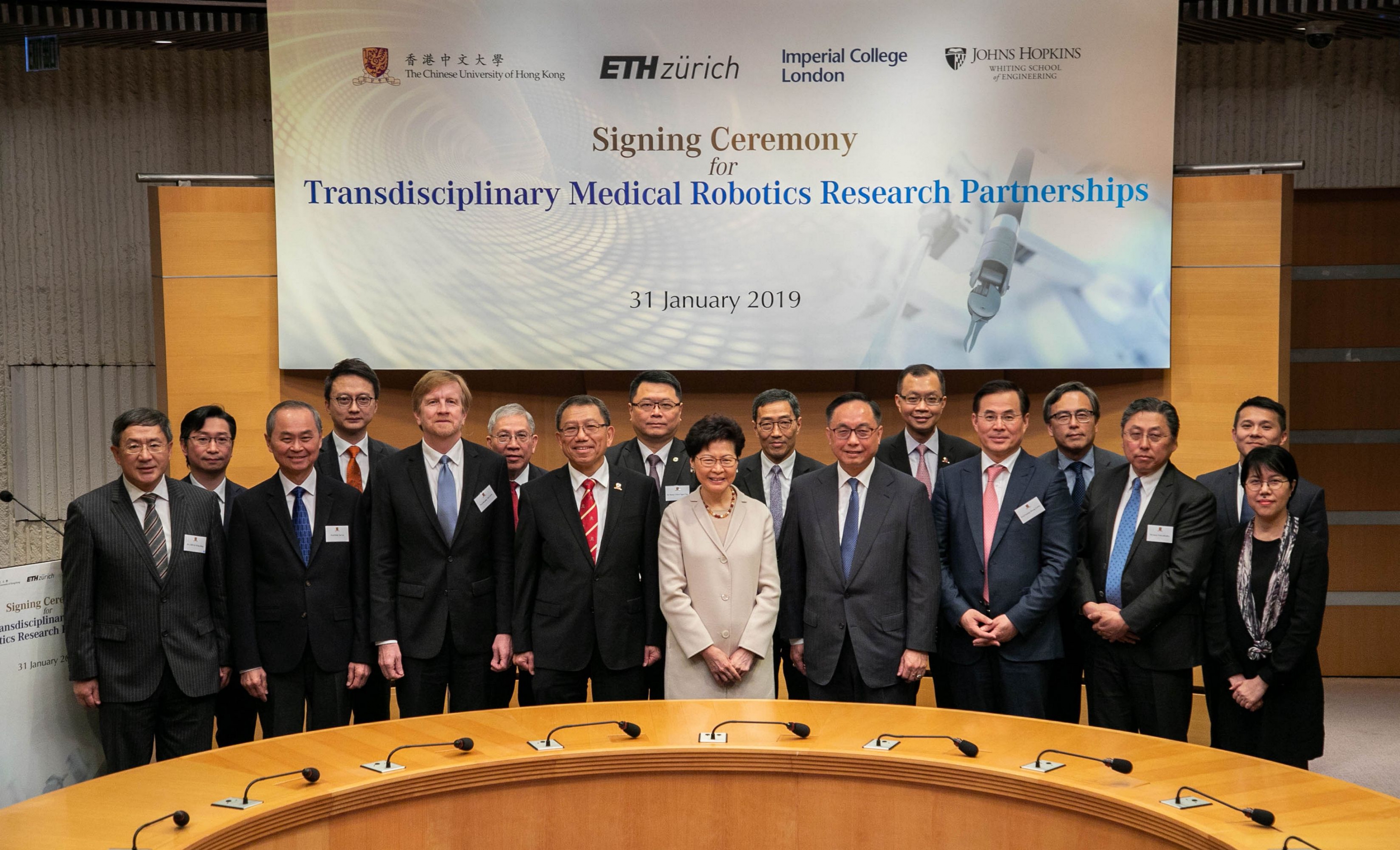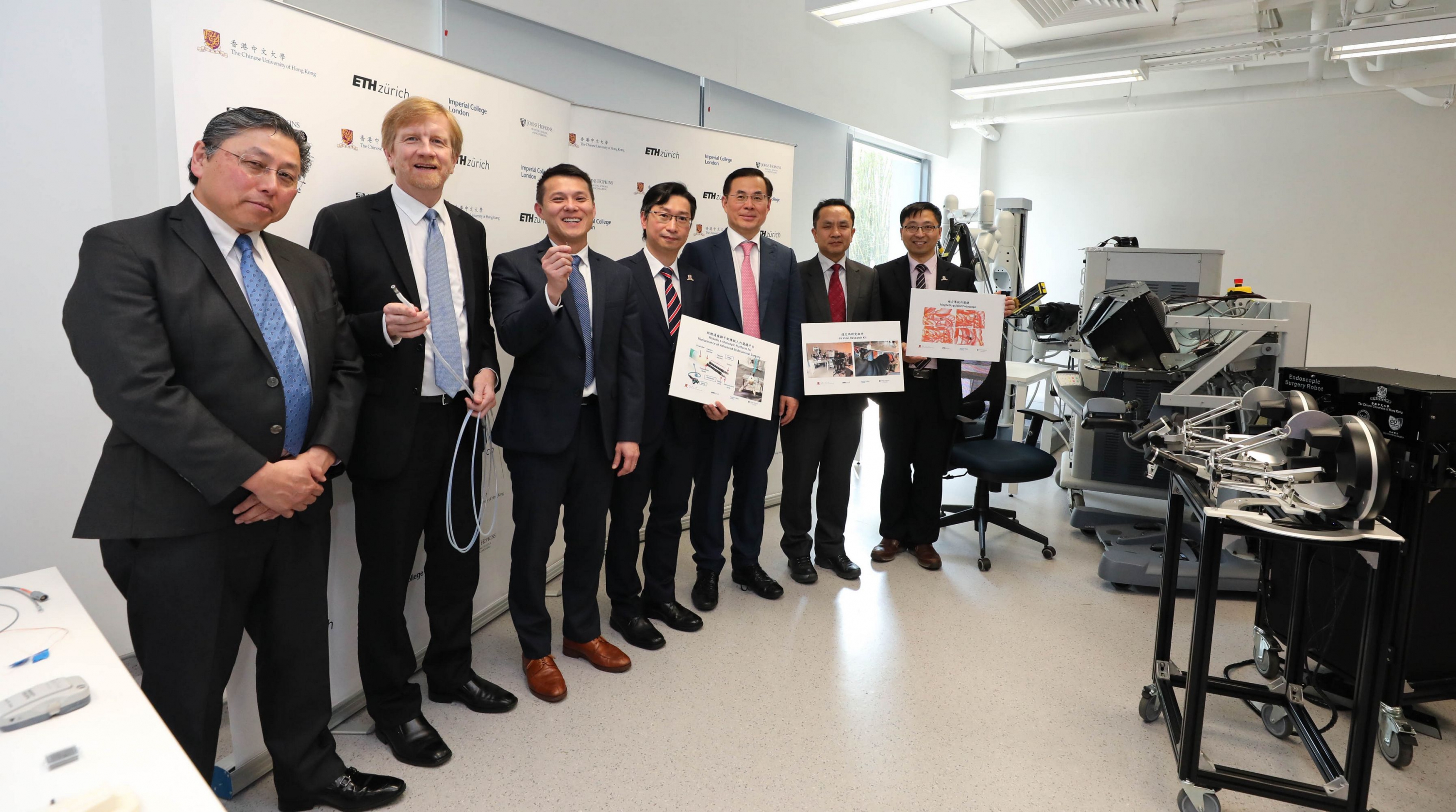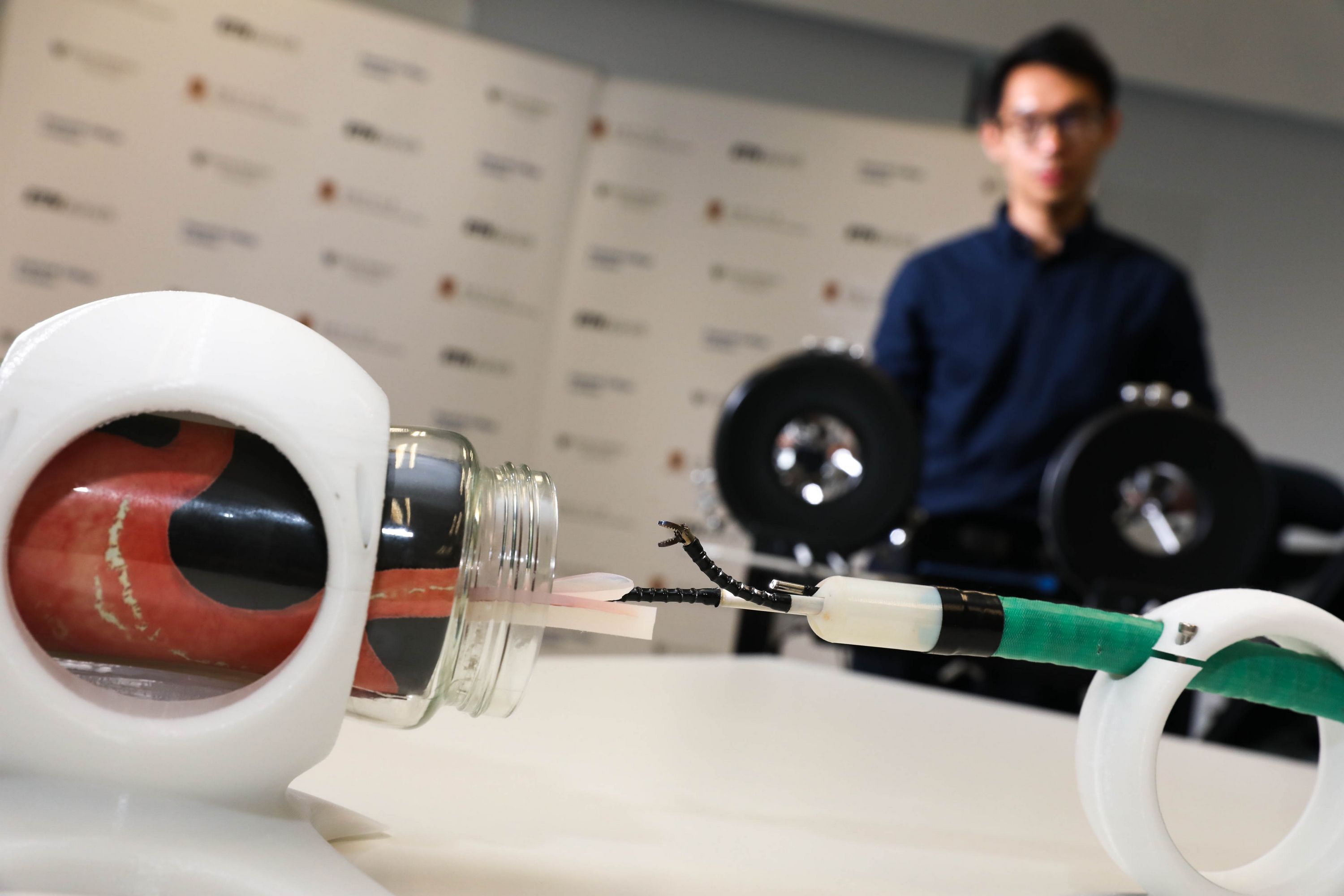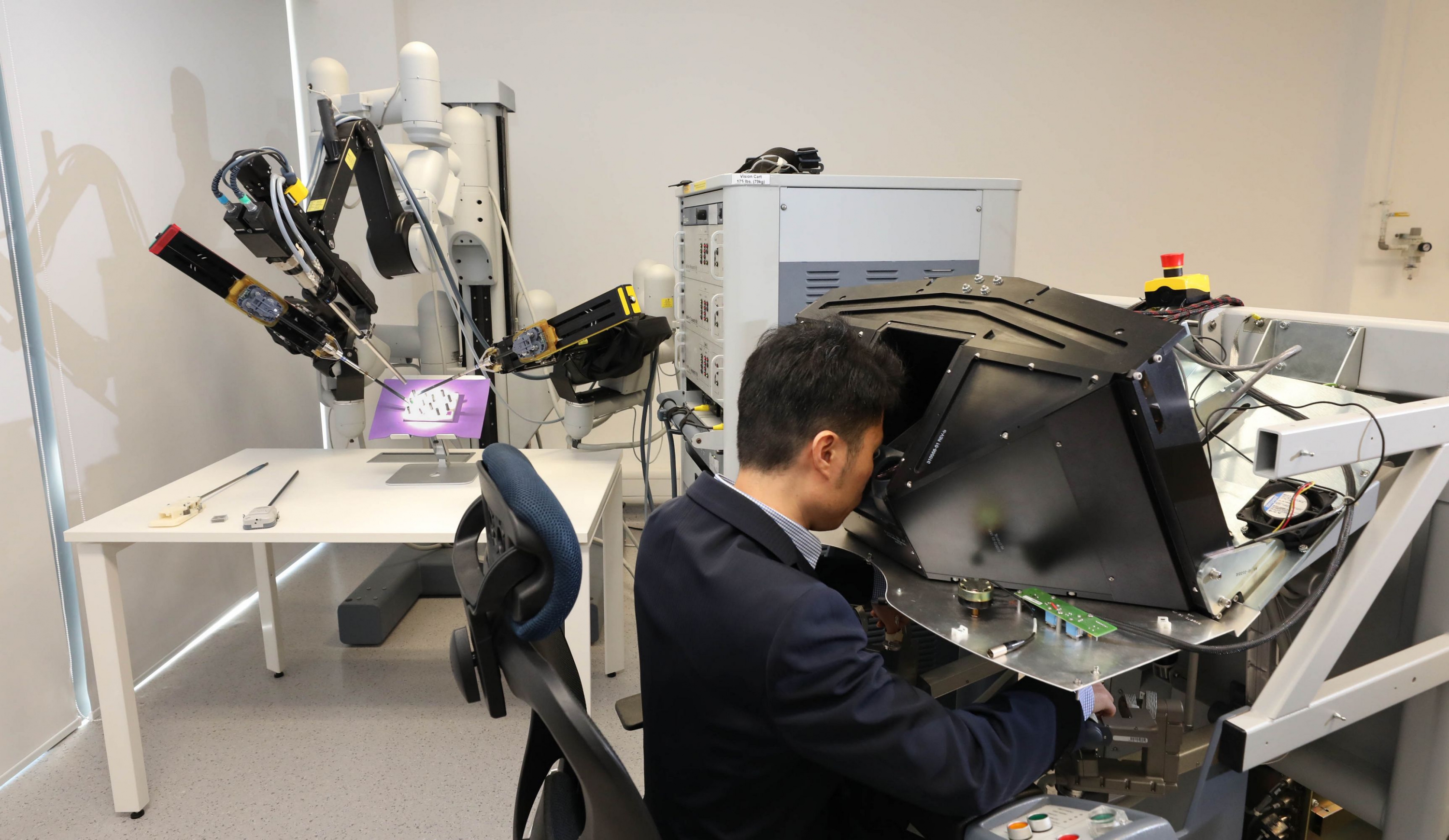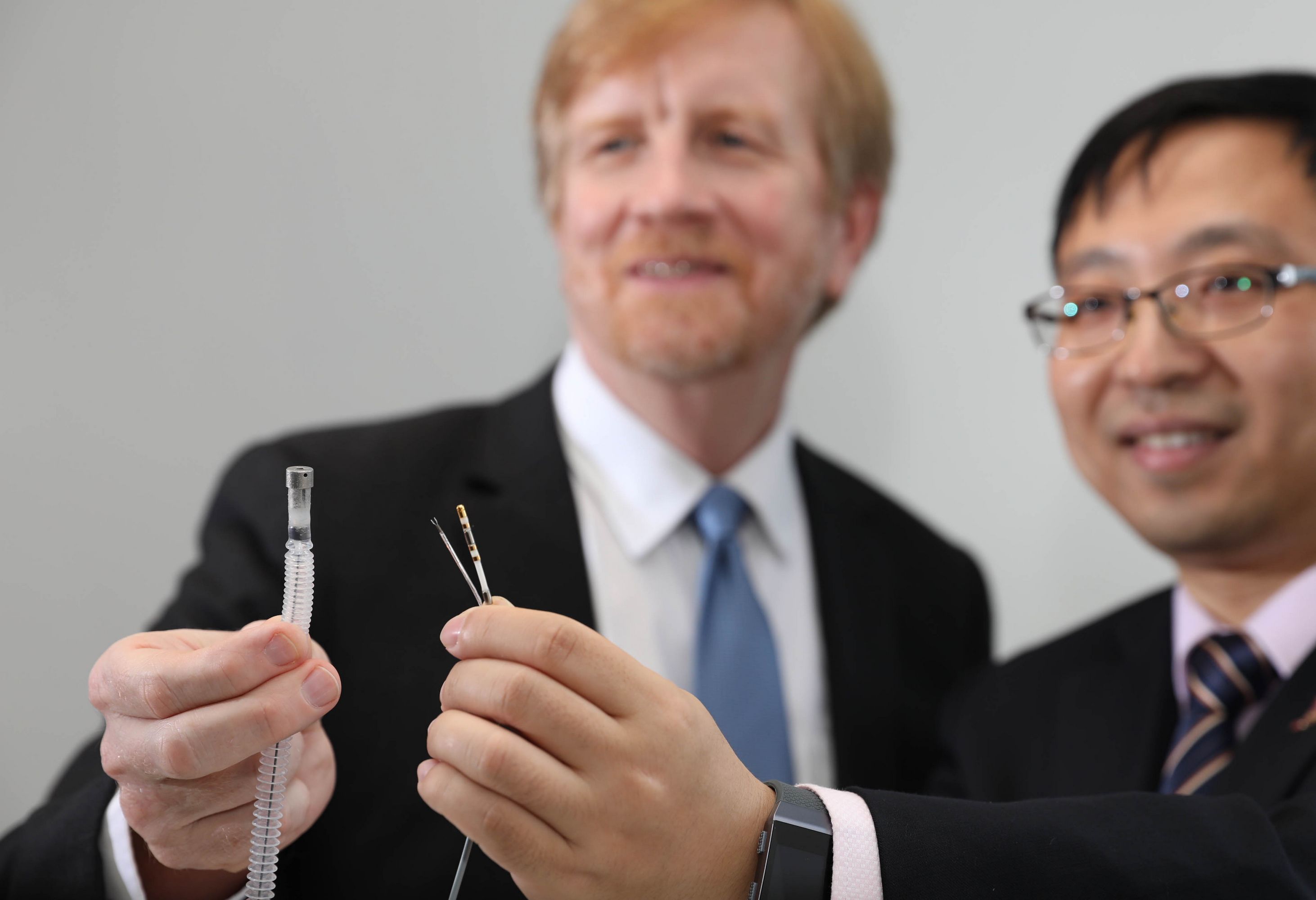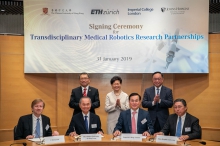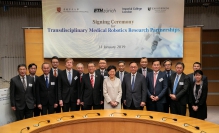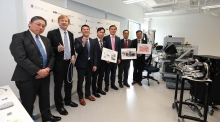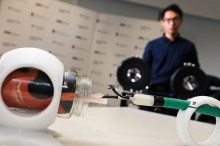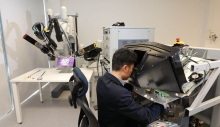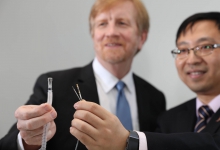CUHK
News Centre
CUHK Deepening Ties with World Leading Institutes for Transdisciplinary Medical Robotics Research to Reshape the Future of Diagnosis and Treatment
The Chinese University of Hong Kong (CUHK) established partnerships with ETH Zurich, Imperial College London and Johns Hopkins University today (31 January) to deepen ties on transdisciplinary medical robotics research. The three top-notch overseas institutions will collaborate with CUHK through the planned Multi-Scale Medical Robotics Centre (MRC) which aims to develop effective and accessible imaging and robotic technologies that will reshape the future of medical diagnosis and treatment of diseases in multiple specialties, and ultimately, improve the quality of life of patients.
The event was witnessed by The Hon Mrs Carrie LAM CHENG Yuet-ngor, The Chief Executive of the Hong Kong Special Administrative Region (HKSAR); Professor Rocky S. TUAN, Vice-Chancellor and President of CUHK; and Mr. Nicholas W. YANG, Secretary for Innovation and Technology of the HKSAR Government.
The Hon Mrs Carrie LAM, The Chief Executive of the HKSAR, said, “Today’s global alliance is made up of three international institutions and CUHK, which are all pioneers in medical robotics. With the coming together of these four prestigious universities, and their world-class robotics expertise, I’m confident the planned Multi-Scale Medical Robotics Centre’s research will advance the diagnosis and treatment of multiple medical specialties.”
Professor Rocky S. TUAN, Vice-Chancellor and President of CUHK remarked, “As a global, leading research university, CUHK is committed to the development of high-impact, cutting-edge research and the support of interdisciplinary and international collaborations. The recent phenomenal support from the HKSAR Government has brought about a wonderful and golden opportunity for the advancement of innovation and technology in the city, the presentation of our research activities on the global stage, and the leveraging of our talents and established strengths in medicine and engineering. We are confident that the planned Medical Robotics Centre will lead to a wellspring of inspiration for the development and dissemination of medical robotic technology in Hong Kong and beyond.”
Robotic technology helps make surgical procedures and many medical treatments that were previously unachievable possible. The application of innovative technology like robotics will greatly enhance the performance of minimally invasive, robotic and endoluminal surgeries, allowing more accessible surgical treatments. Ultimately, more people with diseases can be treated with a less invasive surgical approach. With the ageing population, better patient care can be given to the elderly, and social and economic burden can be lowered.
The planned MRC will conduct three major research programmes, namely “Endoluminal Multiscale Robotic Platforms for Diagnostics and Therapeutics”, “Magnetic-guided Endoluminal Robotic Platform” and “Image-guided Robotic Interventions”, covering a wide range of specialties in medicine, including gastrointestinal endoscopy and surgery; cardiovascular and cardiac surgery; ear, nose and throat; neurology and neurosurgery; ophthalmology; orthopaedics; thoracic; and urology. Experts from electronic engineering, biomedical engineering, mechanical engineering, automation engineering, computer sciences, and robotics will also be engaged on this platform.
Professor Philip Wai Yan CHIU, Co-Director of the planned MRC and Professor of the Department of Surgery of the Faculty of Medicine at CUHK said, “The Centre will focus on technological innovation with a strong emphasis on clinical translation, resulting in direct patient benefits. The transdisciplinary team, consisting of clinicians, engineers and researchers across universities in Hong Kong and worldwide, will work together on the synergistic platform created by this Centre to forge new ways to translate biomedical engineering research innovations into medical technology advances. The inventions will be applicable to both pre-clinical and clinical stages to promote a more sophisticated development of medical robots and instil confidence into patients towards these innovations.”
To further the breadth and depth of expertise involved in this initiative, industry collaboration and support has also been engaged, including global leaders in the manufacturing of precision medical equipment and instruments.
Professor Samuel Kwok Wai AU, Co-Director of the planned MRC and Associate Professor of the Department of Mechanical and Automation Engineering of the Faculty of Engineering at CUHK, added, “Talent development is another focus of the Centre. We shall provide training for surgeons and engineers in robotic technologies to facilitate a fully-integrated clinical approach. With the translation of basic prototypes into medical products, the Centre is also expected to serve as an incubator to foster start-ups and spin-offs in biomedical engineering and healthcare technologies in Hong Kong.”
The team has submitted a proposal to the HKSAR Government under the AIR@InnoHK research cluster initiative.
CUHK establishes partnerships with ETH Zurich, Imperial College London and Johns Hopkins University to deepen ties on transdisciplinary medical robotics research. (Back row) The event was witnessed by The Hon Mrs. Carrie LAM CHENG Yuet-ngor (centre), The Chief Executive of the HKSAR; Professor Rocky S. TUAN (left), Vice-Chancellor and President of CUHK; and Mr. Nicholas W. YANG, Secretary for Innovation and Technology of the HKSAR Government.
The three top-notch overseas institutions will collaborate with CUHK through the planned Multi-Scale Medical Robotics Centre which aims to develop effective and accessible imaging and robotic technologies. (From left) Dr. Larry NAGAHARA, Associate Dean of Research, Whiting School of Engineering, Johns Hopkins University; Prof. Dr. Bradley NELSON, Director of the Multi-Scale Robotics Lab, Institute of Robotics and Intelligent Systems, ETH Zurich; Professor Samuel Kwok Wai AU, Co-Director, Multi-Scale Medical Robotic Centre and Associate Professor, Department of Mechanical and Automation Engineering, Faculty of Engineering, CUHK; Professor Philip Wai Yan CHIU, Co-Director, Multi-Scale Medical Robotic Centre and Professor, Department of Surgery, Faculty of Medicine, CUHK; Professor Guang-Zhong YANG, Director of the Hamlyn Centre for Robotic Surgery, Imperial College London; Professor Yun Hui LIU, Choh-Ming Li Professor of Mechanical and Automation Engineering, Department of Mechanical and Automation Engineering, Faculty of Engineering, CUHK; and Professor Li ZHANG, Associate Professor, Department of Mechanical and Automation Engineering, Faculty of Engineering, CUHK.
CUHK partners with Imperial College London to develop the “Robotic Endoscopic Platform for Performance of Advanced Endoluminal Surgery”, which consists of two robotic arms, and is proved to be able to perform gastric endoscopic submucosal dissection in preclinical study.
A research team led by Johns Hopkins University has created a robust common medical robotics called the da Vinci Research Kit, which allows the research community to share a common open-source medical robotic platform. CUHK has been collaborating with Johns Hopkins University to develop medical robotic instruments and control algorithms to provide safer robotic tools for patients and advanced software package to support the need of the community. The team particularly together developed a gravity compensation software package to provide a precise and reliable gravity compensation for the Master Tool Manipulator (MTM) of the research kit, which can completely compensated or cancelled the gravity effect of the MTM, making the operation safer, more comfortable, and easier.


